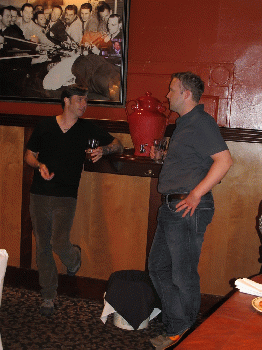Web based social media has come under a lot of criticism in recent years, as it has drawn away readers of newspapers and even viewers of television. This is a major shift in how people access opinions, and this shift has been blamed for the great polarization and growing hostility in our society. It does seem to inhibit serious discussion.
For context, I should probably add that I don't much follow social media, but I am quite aware of how much it dominates a considerable share of public attention. But the concentration of media ownership by big corporations and the consequent uniformity of opinion in broadcast media would also seem to deserve a share of the blame. Topics that in any ware are at odds with corporate interests are avoided by corporate media and can now only be raised elsewhere such as on the internet.
Before the internet came into widespread use, people mostly watched television (and there were only three or four stations) and sometimes read magazines and newspapers to find out what was happening in the world. Before Reagan came to office there were limitations on ownership of broadcast media that prevented excessive concentration. Also, there was the Fairness Doctrine which tended to discipline radio and television stations to attempt fairness in their news presentations. There were only rare instances of enforcement, but that possibility kept broadcast stations attentive to presenting all sides of issues. That balance is sorely missing today and there is polarization.
Broadcast media along with newspapers and magazines use one-way communication that only allows consumers to learn what producers think. With these older media, consumers lack any quick or easy
way to respond and so mostly they are silent. This meant that nearly everyone consumed similar news. People often did disagree, but they had a shared basis for talking at the proverbial office water cooler about the issues of the day.A great advantage of the internet is that consumers can choose among a huge number of producers. But a consequence is a polarization that makes water-cooler discussions difficult and increasingly rare. Much of the problem is that we are missing a common understanding of the basic facts, and it is not clear how that might now change. But the internet is by nature a two-way channel of communication so as compensation there is the potential for discussions, but over the internet rather than over the water cooler. So, it seems particularly sad that an important sector of the web has devolved back into a one-way street. This is the case with video and audio broadcasts but especially in the case of podcasts.
I have long been an avid podcast listener to podcasts for a long while. I learned about them in the 1990's and have never stopped listening. But often I'd be interested in other opinions and at times I'd like to respond to what I hear; podcasts could be an opportunity for facilitating public discussion. But very few podcasts make provision for that sort of conversation. For example, the podcast Left, Right and Center lacks a web page for listeners to discuss what they have learned on a podcast. That limitation on discussion should be easy for them to correct and probably not at a big expense. That would allow listeners to exchange views on the topics that are discussed. But Left, Right and Center serves merely as an example here. It is a good podcast and one that I particularly like, but like nearly every other podcasts it provides no channel for discussions among listeners.
There is a possibility for social media to provide an alternative solution to this deficiency. There could be a topic section for each podcast, with each podcast section subdivided into episodes where listeners could discuss what was said. I looked but failed to find such a site though maybe someday there will be one. That would allow for discussion of important issues even if not at the water cooler. It would not be an in-person discussion but at least it would be a welcome alternative for discussion of conflicting opinions on important subjects.






